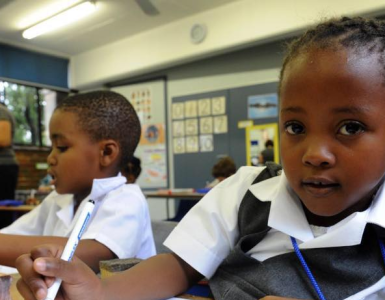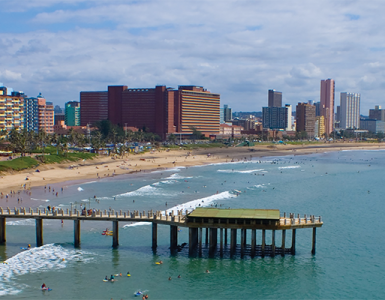GOAL: Sky’s the limit for top-achieving lass who wants to be an astronomer and attributes her success to hard work, resilience and persistence…
By Thuli Zungu

Asande Amahle Nkosi thanks her parents for doing everything they could to succeed in her studies from Grade One.
Asande, a pupil at Future Nation Schools in Fleurhof, Johannesburg, obtained seven distinctions on each on all her subjects: 81 % in English HL (81%); isiZulu FAL (91%); Mathematics (84%); Physical Sciences (84%); Geography (83%); Life Sciences (82%) and Life Orientation (89%).
She is one of the more than 890 000 full-time and part-time candidates who sat for the matric exams administered by the Department of Basic Education (DBE) at the end of 2023. The Matric Class of 2023 have achieved a pass rate of 82.9% – the highest pass rate in the history of the National Senior Certificate (NSC) examinations.
In an interview with WSAM, Asanda said her mother, Phumi, supported her so much during her matric year.
“She would give me motivation and uplift me when I couldn’t do that myself. She would also help me in drafting and constantly updating my study timetable. Her help opened my eyes to the importance of time management. Asande said the matric year was shorter than any other year of study.
“There were many assignments due in a short time span; managing all that work was very tiresome and intense. The year was very fast-paced so teachers would not go into depth with most topics, this has made it harder to grasp certain concepts,” she says.
She got used to not getting enough sleep was another issue – something exacerbated by load-shedding. Thanks to a load-shedding app, she was able to keep track of scheduled electricity cut-offs and prepare for the eventuality.
“I also used LED laps/phone flashlights, so that I could see my books”.
Of her future plans, she said: “I want to be an astrophysicist or /astronomer”.
From Grade One, she would get academic certificates here and there throughout primary school, but, as she transitioned to high school, she was consistently an above average student, attaining multiple awards.
Her excellent school record continued and from Grade 10 up to grade 12, notch first-place marks on specific subjects and Number One student overall.
She had always aimed for 7 distinctions in matric since Grade Eight, and worked tirelessly towards this goal. “So I was expecting these results, nevertheless I was exhilarated when I saw my results because all that handwork throughout the years finally paid off,” she said. “I was the first at the school to receive seven distinctions. Additionally, my school has given me incentives for my performance,” she added.
Her advice to Class of 2024: “To succeed in matric, you need to manage your time. Having a study time-table will assist you to be on track with your assignments and ensure that you have enough time to study for your final exams. Resilience and persistence need to be your best friends, speaking of which, be very careful of the people you surround yourself with, you need to surround yourself with friends that are like minded so that you can motivate each other and be there for each other”.
Ramaphosa hails Northern Cape’s ‘mega-housing project’
BACKLOG: A total R1 billion set aside to create business and working opportunities during the roll-out of the scheme…
By Lehlohonolo Lehana
President Cyril Ramaphosa has described the building of over 4 000 houses in municipalities across the Northern Cape as the biggest in the history of the province.
“This project is going to help reduce the housing backlog in the Northern Cape, as more people have access to housing in urban and rural areas. The most vulnerable in our society will be prioritised as beneficiaries of this mega-housing project.”
“We will strive to ensure that the elderly, child-headed households, military veterans and persons with disabilities get priority in the allocation of these houses. What is significant about this project is that it will also address the housing needs of the so-called ‘missing middle’, people who have a form of income but do not qualify for either subsidised housing or home loans with commercial banks, “Ramaphosa said.
Ramaphosa said the R1 billion will also be used to get rid of shacks and mud homes and also create business and working opportunities – especially in the construction industry – during the next 12 to 18 months.
The project is expected to build more than 4 000 houses in its first phase, with at least 2 000 expected to be completed this year.
The Department of Human Settlements is currently battling the growing backlog of blocked or incomplete human settlements projects.
Ramaphosa said that the funds have been sourced from the Human Settlements Development Grant, and through the province approaching a loan facility of National Treasury and the Development Bank of Southern Africa.
Before the launch of the billion rand project, tripartite alliance partners of the ANC, the Congress of South African Trade Unions (Cosatu) raised numerous concerns – including the poor state of previously built government houses and thousands of incomplete housing projects in the province.
Despite showing initial support for the housing project, Cosatu said it is concerned “about the area where these houses are intended to be built, especially in Kimberley (Roodepan area) given the fact that most of the houses that were recently built in the same Roodepan area are already falling apart.”
“[Cosatu] is also extremely concerned about the government’s delay to implement a project that was previously approved for building an additional 12,800 houses for recipients who do not qualify for government-funded houses nor mortgage bonds because of high property prices in Kimberley,” said the union, slamming the stalled project for not fulfilling its promise of employing 22,000 workers from various sectors.
The union’s Northern Cape branch organised a picket during the president’s launch because “[they] have explored all other avenues seeking answers, but all our efforts fell on deaf ears.”
In response, Ramaphosa said at the launch: “We know that right here in Roodepan and in other parts of the municipality, there are social housing structures that were not built according to quality standards or are facing challenges with wastewater drainage and groundwater seepage – this will not be allowed to happen again.”
He said the launch of the project was a further demonstration that government was making good on its commitment to fulfil the human rights of all South Africans.
Despite the current challenges in the country, the President said the government has made progress in expanding access to housing since the advent of democracy.
“This year, we celebrate 30 years since achieving our democracy. Last year, Statistics South Africa released the results of Census 2022, which give an indication of the strides we have made in improving the lives of the South African people.
“When the census was conducted in 2022, nearly 9 out of every 10 households were living in formal dwellings. When the first census in a democratic South Africa was held in 1996, only 6 out of every 10 households lived in a formal dwelling.
“In South Africa today, 8 out of every 10 households have access to piped water either inside their home or in the yard. These are achievements we must celebrate, “Ramaphosa said.





























